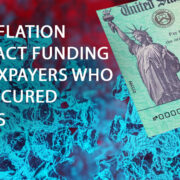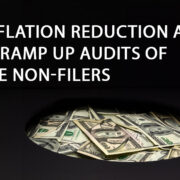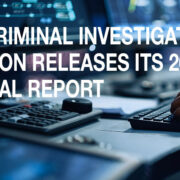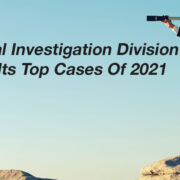IRS Using Inflation Reduction Act Funding To Catch Taxpayers Who Illegally Secured COVID Funds
IRS Using Inflation Reduction Act Funding To Catch Taxpayers Who Illegally Secured COVID Funds
IRS announced it has investigated 1,644 tax and money laundering cases related to COVID fraud potentially totaling $8.9 billion, with well over half that amount coming from cases opened in the last year.
Under the Inflation Reduction Act the IRS is receiving $80 billion in new funding over nine years. The $80 billion price tag is more than six times the current annual IRS budget of $12.6 billion. The money will be distributed to IRS over nine years and comes with few strings attached.
IRS Claims Of Collection Enforcement And Examinations
On March 28, 2024 the IRS announced continued progress to expand enforcement efforts and increase scrutiny related to a wide range of criminal activity, including fraudulently obtained loans, credits and payments meant for American workers, families and small businesses under the Coronavirus Aid, Relief and Economic Security (CARES) Act as a result of the additional funding it is receiving under the Inflation Reduction Act.
As of February 29, 2024, 795 people have been indicted for their alleged COVID-related crimes and 373 individuals have been sentenced to an average of 34 months in federal prison. During the last four years, the IRS Criminal Investigation Division (CI) reports it has obtained a 98.5% conviction rate in prosecuted COVID fraud cases.
IRS Commissioner Danny Werfel noted Inflation Reduction Act resources allows “IRS Criminal Investigation to provide a vital role in protecting against fraud and serves a key part in the agency’s wider efforts to ensure fairness in the nation’s tax system. Protecting taxpayers against fraud in pandemic-era programs is just one example of the important role that CI plays in the law enforcement community. A healthy budget for the IRS helps us get the job done, and the work of CI provides a critical safety net to protect the nation against fraud.”
“In the last year alone, we have opened nearly 700 new COVID fraud investigations that collectively add up to $5 billion in potential fraud,” said CI Chief Guy Ficco. “While COVID may no longer be top of mind to the average American when they wake up, the fraud committed through these different programs is very much top of mind to CI. Our special agents continue to seek out fraudsters who stole money from government loan programs for their personal gain.”
New examples of cases closed since the Inflation Reduction Act passed
- Long Island man sentenced to 10 years in prison for sprawling COVID-19 loan fraud – In March 2024, Rami Saab, also known as “Rami Hasan,” was sentenced to 10 years in prison and required to pay $9.6 million in restitution for his role as the mastermind behind a sprawling conspiracy to fraudulently obtain loans amid the COVID-19 pandemic. Saab and a network of co-conspirators fraudulently applied for more than $32 million in loans from the Paycheck Protection Program (PPP) and Economic Injury Disaster Loan Program (EIDL) on behalf of shell corporations they controlled. Relying on false information and fabricated documentation supplied by Saab and his conspirators, the Small Business Administration (SBA) and private banks administrating the PPP and EIDL programs granted at least 20 such applications, resulting in Saab and his fellow conspirators receiving $9.6 million in emergency-relief funds intended for distressed small businesses. Using a web of more than 50 otherwise dormant bank accounts, Saab and others laundered the proceeds before using the funds for their own self-enrichment.
- Toledo area man sentenced to 94 months in prison for COVID fraud – Terrence L. Pounds was sentenced in March 2024 to 94 months in prison and ordered to pay more than $4.2 million dollars to the SBA after being convicted of conspiracy to commit wire fraud, wire fraud and money laundering. Pounds and his co-defendants devised a scheme to obtain SBA-financed loans from the EIDL Program and the PPP under false pretenses, often claiming the loans were for nonprofit, faith-based organizations with over $1 million in revenue and 15 employees. He successfully obtained millions of dollars in loans and then used the money to purchase several new vehicles, which were later forfeited to the U.S. government.
Importance To Preserve Records
Keep in mind that the IRS has up to three years to select a tax return for audit. For California taxpayers, the Franchise Tax Board has up to four years to select a California State Income Tax Return for audit. In some cases these 3 and 4 year periods are extended to six years. When a taxpayer is selected for audit, the taxpayer has the burden of proof to show that expenses claimed are properly deductible. Having the evidence handy and organized makes meeting this burden of proof much easier.
Essential Records to Have for a Tax Audit
If you are getting ready for a tax audit, one of the most important things to do is gather and organize your tax records and receipts. There’s a good chance that you have a large amount of documents and receipts in your possession. No matter how organized you are, it can be a daunting task to collect the right pieces and make sure that you have them organized and handy for the audit conference.
We have seen many tax audits that hinge on whether or not the taxpayer can provide proper documentation for their previous tax filings. A tax lawyer in Orange County or elsewhere can make sure that the documentation is complete and proper. By submitting this to your tax attorney in advance of the audit, your tax attorney can review your documentation and determine if there are any gaps that need to be addressed before starting the dialogue with the IRS agent.
So what are the most essential tax records to have ahead of your audit? Here are a few must-have items:
- Any W-2 forms from the previous year. This can include documents from full-time and part-time work, large casino and lottery winnings and more.
- Form 1098 records from your bank or lender on mortgage interest paid from the previous year.
- Records of any miscellaneous money you earned and reported to the IRS including work done as an independent contractor or freelancer, interest from savings accounts and stock dividends.
- Written letters from charities confirming your monetary donations from the previous year.
- Receipts for business expenses you claimed.
- Mileage Logs for business use of vehicle.
- Entertainment and Travel Logs for business
Appealing Results Of An IRS Tax Audit
Now if your IRS tax audit is not resolved, the results may be challenged. After the Revenue Agent has concluded the tax examination, the agent will issue a copy of the examination report explaining the agent’s proposed changes along with notice of your appeals rights. Pay attention to the type of letter that is included as it will dictate the appeals process available to you.
The “30-day letter”
The “30-day letter” gives you the right to challenge the proposed adjustment in the IRS Office Of Appeals. To do this, you need to file a Tax Protest within 30 days of the date of the notice. The Appeals Office is the only level of appeal within the IRS and is separate from and independent of the IRS office taking the action you disagree with. Conferences with Appeals Office personnel are held in an informal manner by correspondence, by telephone, or at a personal conference.
The “Notice Of Deficiency”
If the IRS does not adopt your position, it will send a notice proposing a tax adjustment (known as a statutory notice of deficiency). The statutory notice of deficiency gives you the right to challenge the proposed adjustment in the United States Tax Court before paying it. To do this, you need to file a petition within 90 days of the date of the notice (150 days if the notice is addressed to you outside the United States). If you filed your petition on time, the court will eventually schedule your case for trial at the designation place of trial you set forth in your petition. Prior to trial you should have the opportunity to seek a settlement with IRS Area Counsel and in certain cases, such settlement negotiations could be delegated to the IRS Office Of Appeals. If there is still disagreement and the case does go to trial, you will have the opportunity to present your case before a Tax Court judge. The judge after hearing your case and reviewing the record and any post-trial briefs will render a decision in the form of an Opinion. It could take as much as two years after trial before an Opinion issued. If the Opinion is not appealed to a Circuit Court Of Appeals, then the proposed deficiency under the Opinion is final and your account will be sent to IRS Collections.
IRS Area Counsel are experienced trial attorneys working for the IRS whose job is to litigate cases in the U.S. Tax Court and look out for the best interests of the Federal government. So to level the playing field, it would be prudent for a taxpayer to hire qualified tax counsel as soon as possible to seek a mutually acceptable resolution without the need for trial, and if that does not happen, to already have the legal expertise in place to vigorously defend you at trial.
What Should You Do?
We encourage taxpayers who are concerned about their COVID funding awards to come in voluntarily before the IRS commences any examination or investigation. By then, it will be too late to avoid the risk of returning all COVID funds awarded plus interest and penalties as well as facing criminal prosecution.
If you are selected for an audit, stand up to the IRS by getting representation. Tax problems are usually a serious matter and must be handled appropriately so it’s important to that you’ve hired the best lawyer for your particular situation. The tax attorneys at the Law Offices Of Jeffrey B. Kahn, P.C. located in Orange County (Irvine), the San Francisco Bay Area (including San Jose and Walnut Creek) and elsewhere in California are highly skilled in handling tax matters and can effectively represent at all levels with the IRS and State Tax Agencies including criminal tax investigations and attempted prosecutions, undisclosed foreign bank accounts and other foreign assets, and unreported foreign income. Also if you are involved in cannabis, check out what a cannabis tax attorney can do for you and if you are involved in crypto-currency, check out what a Bitcoin tax attorney can do for you.











 Follow
Follow Follow
Follow